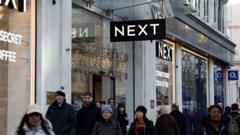Is the UK Economy Facing Anaemic Growth Ahead?

Published: 2025-09-18 12:55:19 | Category: technology
Next, a prominent UK fashion retailer, has issued a warning about the country's economic outlook, predicting "anaemic" growth and reduced job opportunities due to high taxes and government spending commitments. Despite reporting a 13.8% increase in pre-tax profits to £515 million for the six months ending July, the company's shares dropped by 6% in early trading. Next's forecast suggests that while the economy is not on the brink of collapse, the overall future looks bleak, primarily influenced by a declining job market, new regulations, and rising taxes.
Last updated: 05 October 2023 (BST)
Key Takeaways
- Next reported a 13.8% rise in pre-tax profits but warned of "anaemic" growth.
- The company sees declining job opportunities and increased government spending as major concerns.
- Job vacancies in the retail sector have decreased by 35%.
- Next's shares fell by 6% following the profit announcement.
- Economists predict that inflationary pressures will impact consumer spending negatively.
Understanding the Current Economic Climate
The UK economy is facing a challenging environment as retailers like Next signal caution. Chief Executive Lord Wolfson highlighted the four main pressures impacting growth: declining job opportunities, increased regulation, government spending commitments beyond means, and a rising tax burden. These factors collectively create an atmosphere of uncertainty for businesses and consumers alike.
Next's Financial Performance
Despite the gloomy economic outlook, Next reported a significant increase in profits, attributing this success to favourable summer weather and disruptions faced by competitor Marks & Spencer. The company's pre-tax profits rose to £515 million, marking a substantial gain compared to previous periods. However, even this success has not insulated Next from broader economic trends.
Declining Job Opportunities
Next's report indicates a concerning trend in job vacancies within the retail sector. The company noted a 35% decrease in job openings, particularly within its physical stores. This decline is attributed to multiple factors:
- Rising operational costs, including wages and National Insurance contributions.
- New regulations that increase the complexity and cost of hiring.
- Technological advancements leading to job displacement.
These challenges particularly affect entry-level positions, which are crucial for many individuals entering the job market. As Next pointed out, the PAYE payroll numbers are also declining, reflecting a broader trend in the economy.
Implications for the Retail Sector
The retail sector has faced immense pressure in recent years, with several high-profile collapses, including Claire's and Poundland. Clare Bailey, an independent retail expert, emphasised that Next's impressive profit figures are remarkable given the industry's current challenges. Retailers are grappling with rising costs and a competitive landscape that has become increasingly hostile.
Inflation and Consumer Spending
The inflationary environment poses significant threats to consumer spending. Analysts predict that increasing costs will inevitably lead retailers to raise prices, further squeezing household budgets. Natalie Berg, a retail analyst, noted that while Next has shown resilience, the ongoing inflationary pressures could hinder investment in stores and staff, crucial for long-term growth.
Looking Ahead: What’s Next for Next?
Next remains optimistic about its future, citing various growth opportunities both in the UK and abroad. The company believes it is well-positioned to navigate the current economic landscape, despite the challenges. However, the upcoming government Budget in November will be pivotal, as it will outline tax and spending plans that could directly impact the retail sector.
The Role of Government Policy
As Next prepares for potential economic shifts, the government's fiscal policies will play a critical role in shaping the retail environment. With many retailers struggling, there are calls for reforms to ease the tax burden and encourage investment. Next's cautious stance aligns with broader concerns about the sustainability of current government spending commitments.
What Does This Mean for Consumers?
For consumers, the implications of Next's warnings are significant. As retailers grapple with rising costs, shoppers may face higher prices as businesses attempt to maintain profitability. This could lead to a further tightening of household budgets, affecting discretionary spending and overall economic health.
Conclusion: Reflecting on the Future
The outlook for the UK economy, particularly in the retail sector, remains uncertain. While companies like Next continue to report profits, the underlying challenges cannot be ignored. The interplay between government policy, inflation, and consumer behaviour will be crucial in shaping the future of retail. As we await the government's Budget announcement, questions remain about how these factors will influence both businesses and consumers in the coming months.
FAQs
What is meant by "anaemic" economic growth?
"Anaemic" economic growth refers to slow or insufficient growth in the economy, indicating that it is struggling to expand at a healthy rate. This can lead to reduced job opportunities and lower consumer spending.
How has Next performed financially despite economic challenges?
Next reported a 13.8% increase in pre-tax profits, reaching £515 million for the six months ending in July, largely due to favourable seasonal conditions and market disruptions faced by competitors.
What factors are contributing to declining job opportunities in retail?
Declining job opportunities in retail are attributed to rising operational costs, new regulations that complicate hiring, and the displacement of jobs due to automation and artificial intelligence.
What impact does inflation have on retail prices?
Inflation leads to increased costs for retailers, which often results in higher prices for consumers as businesses pass on these costs to maintain profit margins.
What is the significance of the upcoming government Budget?
The upcoming government Budget is crucial as it will outline tax and spending plans that could significantly impact the retail sector, influencing business operations and the economic environment.



